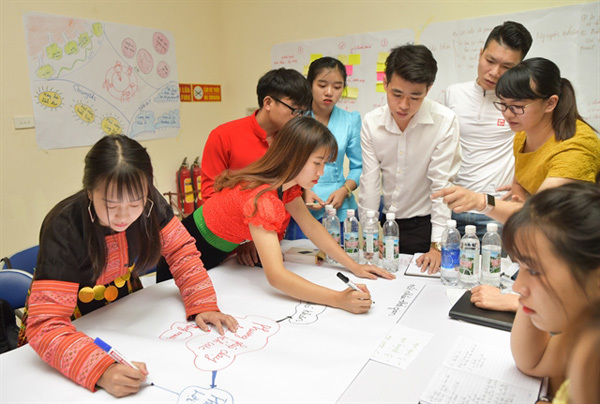 |
| Students at Tay Bac University in the northern mountainous province of Son La discuss in groups during a lecture. The Ministry of Education and Training is implementing the Government's plan to implement the Vietnam National Qualifications Framework. — Photo utb.edu.vn |
This will stipulate the minimum learning outcomes for a tertiary level, meaning all majors at one level must meet the minimum output standards specified in the framework.
“The biggest social responsibility of a higher education institution is the production of people with professional skills and soft skills to effectively serve the development of society,” Nguyen Thu Thuy, Acting Director of Higher Education Department, Ministry of Education and Training, told Việt Nam News.
“We are not only training human resources for the domestic market but also towards the regional and world markets.
“The objectives of the VQS is the equivalent recognition of Vietnamese diplomas, certificates and qualifications to those of regional and international diplomas, certificates, and degrees. Consequently, Vietnam can source our manpower to the world.”
According to her, to implement the Vietnam’ VQS, the Ministry of Education and Training has worked with educational section in other countries and participated in the ASEAN Qualifications Reference Framework (AQRF).
Meeting at least twice a year, the goal of a national AQRF committee is to have all countries refer to their national qualifications framework with the qualifications framework of the region, towards recognition and help human resources move across borders in Asian countries.
Thuy said this consists of many steps, in which the development and promulgation of Standards are very important.
She added: “Based on those standards, Vietnam’s universities can develop a new program or renew the existing program to meet the standards.
“In the process, the universities improve their capacity to attract students, create high outputs, and meet labour market requirements.
“Standard universities can continue to improve their capacity. Each school has the autonomy in issuing a higher-than-standard training program, with specific nuances, and has its own brand. Although Standard is the minimum requirement, it must be asymptotic to the world.
“To build the standard, we need to get the attention of many parties, not only educational institutions but also businesses, employers, professional associations, experts, researchers, and State management agencies to meet the requirements of the stakeholders.
“The process of developing the Standard was supported by international experts, including people from Australia, a country with a strong educational background, especially higher education. In particular, Australia’s VQS has many advantages for us learn. Australian experts accompanied us from the first drafts of the Standard and helped us to raise awareness, spread the goals and the need to promulgate standards and apply them in practice.
“I believe that with the co-operation of the stakeholders, we will accelerate the implementation of the Vietnam National Qualifications Framework”. VNS

University autonomy helps raise quality in PhD education
Professor Le Vinh Danh, president of Ton Duc Thang University, talks about upcoming changes in PhD education in Vietnam.

Dual degree programmes start this academic year
Several universities in Ho Chi Minh City will launch dual-degree training programmes in the 2020-2021 academic year in an aim to offer more diverse choices for students.
 The Ministry of Education and Training is to implement the Vietnam National Qualifications Framework (VQF).
The Ministry of Education and Training is to implement the Vietnam National Qualifications Framework (VQF).